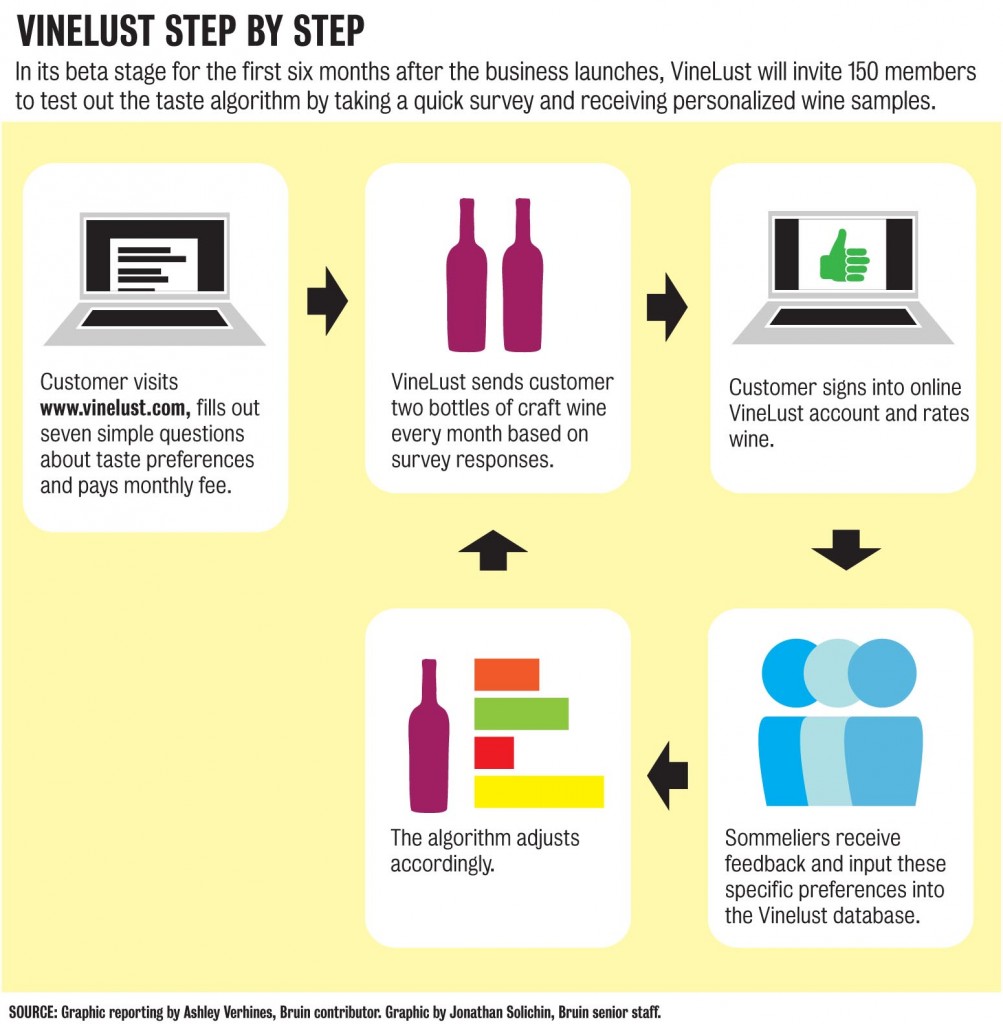The golden age of the algorithm is now.
As Netflix’s personalized video recommendation algorithm catalyzed mass online film distribution and Pandora Radio’s music recommendation algorithm redesigned the way people find new music, so is VineLust’s taste algorithm pioneering the way wine will be recommended and distributed.
VineLust is a startup wine e-commerce business and the brainchild of founder Pallavi Patil, a graduate student in the UCLA Anderson School of Management as well as a self-described “foodie” and lover of wine. After completing her undergraduate education at New York University’s Stern School of Business, she spent the last five years working on Wall Street before coming to school at UCLA. During that time, Patil took many trips to Napa Valley and Santa Barbara, where she indulged her love of wine and dreamed up her own business: VineLust.
“I started thinking about all these websites that help you make decisions. Netflix tells you what movies you’ll probably like,” Patil said. “With Pandora, you click the kind of music that you like and it brings you to similar music. I wanted to create something similar for people who really love wine but don’t know how to explore it.”
This became the subject for Patil’s Applied Management Research Program, the capstone of UCLA Anderson’s MBA program in which students gain practical business experience by either consulting for assigned companies or creating their own businesses.
Patil chose the latter. Over the last year, Patil has banded together a team of four other graduate students in Anderson’s MBA program and two San Francisco-based wine sommeliers.
 [media-credit name=”Jonathan Solichin” align=”alignnone” width=”620″]
[media-credit name=”Jonathan Solichin” align=”alignnone” width=”620″]
Together, they created an algorithm to predict wine preference and tested it by surveying volunteers and hosting focus group taste tests.
“What we started doing was having people take (this) survey and then come to a live tasting with wines that they, theoretically, should like or shouldn’t like,” said Georgie Thomas, graduate student at Anderson and vice president of business development and operations for VineLust. “We were getting about a 75 to 80 percent accuracy.”
The VineLust website, set to launch by Friday, will feature a seven-question survey that accounts for everything from the country and region individuals originate from, to subjective taste preferences including acidity, sugar, tannins and paired with food or not. Responses are input into the algorithm to determine what kinds of wine an individual would prefer.
Based on this determined preference, customers receive two different bottles of craft wines for a service fee of $59.99 per month. The wine is supplied by Monopole Wine, VineLust’s partner wine retailer based in Pasadena.
“People like being connected to the product that they’re consuming,” Patil said. “Although we aren’t going directly to the wineries, (the premise is) that we can connect people to these small, family-owned or small wineries.”
The price point is such that purchasing the same bottles at a wine retailer would cost around $30 each, said Thomas. After receiving the shipment, customers can sign back onto their online profile and rate the wine. This feedback in turn expands the database, and consequent packages are increasingly catered to individuals’ preferences.
The first six months after the business launches will be a beta period in which the team can improve the accuracy of the algorithm by deepening the database, thereby ensuring high-quality products and customer service. In order to achieve this, VineLust will cap membership at 150 California-based members.
“If we can make these first 150 really happy, we’re pretty confident that can snowball quickly once we open it up to more people,” said Evan Shuster, a graduate student at Anderson and VineLust’s vice president of marketing.
Patil is currently bootstrapping the business with her own money, so working as economically efficiently as possible is key.
“This initial phase is really about doing everything as cheaply as possible, as quickly as possible, getting it out there, getting feedback and then iterating that,” Thomas said. “Make the mistakes early, see what works and then capitalize on that.”
Though logistics, data crunching and algorithms are essential foundations for any business, Patil reminds that VineLust has nobler intentions than a staunch supply-and-demand alone. She said that many people view wine as strictly “upper class” and even “pretentious,” but she hopes to dismantle this misconception.
“I think wine should be all about what you’re enjoying,” Patil said. “Enjoying what’s in your glass and memories with friends.”
